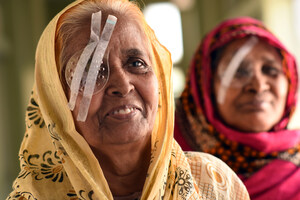- Presentation Emphasises Link between Poverty and Eye Health
HYDERABAD, India, Sept. 19, 2012 /PRNewswire/ -- ORBIS, the Brien Holden Vision Institute and African Vision Research Institute (AVRI) have joined forces around the issue of eye health and poverty in South Africa.
(Logo: http://photos.prnewswire.com/prnh/20100614/DC20562LOGO)
"The Poverty and Eye Health Study will lay the foundation for service delivery mechanisms providing access for poor to life transforming eye health services in South Africa," said Lene Overland, Director of Programme at ORBIS Europe, Middle East and Africa.
The consortium aims to improve the understanding of the impact of visual loss on poverty. More importantly, the consortium aims to develop relationships with key organisations working in poverty reduction to mainstream eye health, and in particular cataract and refractive errors as the leading causes of blindness and visual impairment.
"It is critical that we contextualise eye health and the work of civil society in the context of national priorities and the broader development agenda," said Kovin Naidoo, Global Programmes Director at the Brien Holden Vision Institute and CEO of AVRI. "Efforts such as linking poverty and eye health will be beneficial to the expansion of eye health services and contribute to empowering people to participate fully in society."
It has long been thought that poverty and poor eye health are linked in a vicious cycle. In developing communities it is perceived that the blind are more likely to become poor, and the poor are more likely to become blind and thus become further entrapped in poverty.
The World Health Organisation (WHO) states that 80% of all visual impairment can be avoided or cured, if people had access to appropriate services. Studies also indicate that 90% of blind people live in developing countries, suggesting a link between poor eye health and poverty.
"We hope that the new knowledge generated through the Poverty and Eye Health Study will aid advocacy efforts with governments and other civil society sectors and promote a greater focus on the anti-poverty programmes," said consortium members, Overland and Naidoo.
The ambitious project was announced by Overland and Naidoo, during a presentation at the International Agency of the Prevention of Blindness (IAPB) Ninth General Assembly (9GA) on the 19 September at 10:15 at the Pavilion.
About ORBIS:
ORBIS is a non-profit, humanitarian organization dedicated to saving sight worldwide. ORBIS prevents and treats blindness through hands-on training, public health education, improved access to quality eye care, advocacy and partnerships with local health care organizations. By building their long-term capabilities, ORBIS helps its partner institutions take action to reach a state where they can provide, on their own, quality eye care services that are affordable, accessible, and sustainable. To learn more about ORBIS, please visit www.ORBIS.org.
About the Brien Holden Vision Institute:
On 3 September 2012, the International Centre for Eye Care Education (ICEE) changed its name to that of its founding supporter and partner, The Brien Holden Vision Institute.
The two organisations have aligned to harness their networks, expertise and resources, and together, achieve much more. Our purpose is to provide excellent and equitable vision care solutions for everyone, everywhere.
Through collaborations with leading research and industry organisations the Brien Holden Vision Institute works to develop innovative vision correction products for the treatment of the most common eye conditions. It also seeks to apply its vision research more broadly in other medical applications.
In partnership with local governments, health care providers, education institutions and communities, the Brien Holden Vision Institute Foundation works to build sustainable eye care systems through service development, education, training activities and related research in developing communities worldwide. By providing multidisciplinary postgraduate research opportunities we help to produce the next generation of researchers, educators, public health specialists and practitioners, to work towards superior vision outcomes for all people. To learn more about the Brien Holden Vision Institute, please visit http://www.brienholdenvision.org/.
About AVRI:
The African Vision Research Institute (AVRI) is an African-based institute that links, institutions, organizations, academics and intellectuals in the pursuit of confronting the challenges of Africa's eye health issues. The organization was conceived during a World Health Organization meeting on Global Eye Research in Geneva, July 2003, where the need for an organization that focused on enhancing research capacity on the African continent and thereby positively impacting on publication output by African researchers involved in vision care in peer-reviewed journals was identified. As an Institute, AVRI aims to reduce the burden of blindness in Africa by encouraging research activity among African scientists that is relevant to the control of eye diseases, human resource development and infrastructural capacity enhancement for increased eye care service delivery on the African continent. The mission of the Institute is to develop research capacity and appropriate skills in an effort to eliminate visual impairment and avoidable blindness in Africa, in support of VISION 2020: The Right to Sight campaign initiated by the World Health Organization in 2000. This global campaign draws stakeholders involved in eye care to escalate and coordinate efforts towards eliminating avoidable blindness in the world by the year 2020.
To learn more about AVRI, please visit www.avri.co.za.
WANT YOUR COMPANY'S NEWS FEATURED ON PRNEWSWIRE.COM?
Newsrooms &
Influencers
Digital Media
Outlets
Journalists
Opted In




Share this article